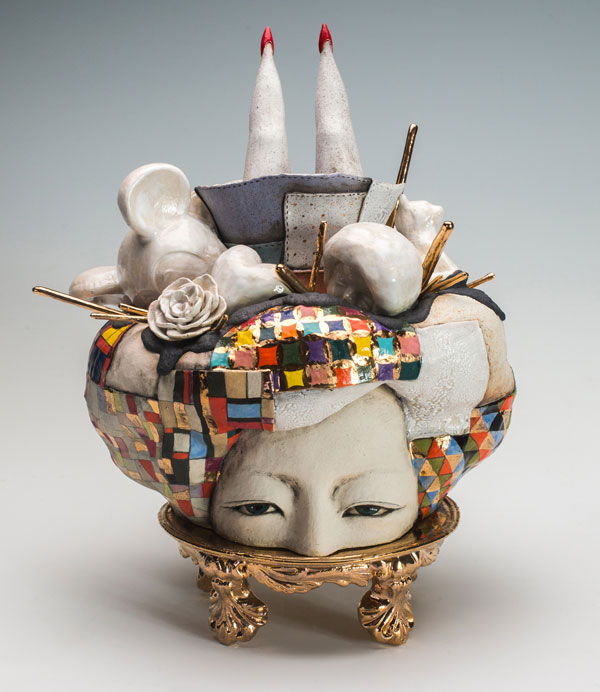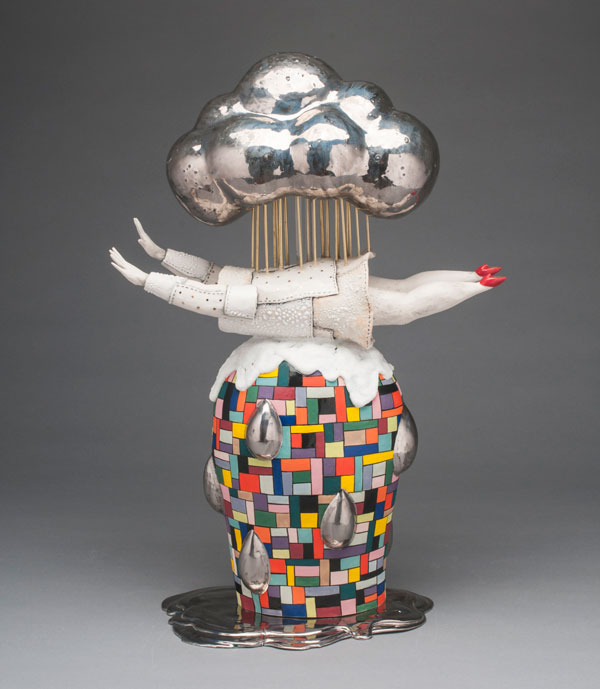Right as you cross the threshold into Ahrong Kim’s show “Internal Voice” at the Clay Studio, you’re met by five pairs of eyes set into brightly colored teapots resting at eye level on plinths jutting from the wall. The eyes, embedded into fragmented faces, exposed from brow line to the bridge of the nose, gaze at you almost impassively, their nonchalance at odds with the variety of textures and patterns that claim the rest of the body of the pottery. “Be careful,” they seem to say as you look away, uncomfortable, and cast your gaze into the gallery proper, “we’re all mad here.”
Kim’s statement for “Internal Voice” describes the works that comprise the show as revealing an “abstracted version of [her] interiority.” In essence, a conceit that the pieces on display reflect a frame of mind that is as close as you’ll ever get to the inside of someone else’s head—irrational, strange and insouciant, made up of images and icons scavenged from life and thrown together as if in a reflection of dream logic, where symbols collide and combine in chimerical yet convincing ways.
Inner Fountain (2017) presents the most straightforwardly literary example of this kind of surrealist world-building, compiling motifs from Lewis Carroll’s Alice’s Adventures in Wonderland: playing cards, melting clocks, cups of tea, rabbit ears—atop another dead-eyed half-face (suggesting that this paraphernalia is in the process of springing directly from the brain contained within, and into our world).
Dive In (2016) introduces another of Kim’s repeating visuals—the headless cartoonish female figure—as its stubby legs and tiny feet emerge from a lumpy, balloon-esque mass precariously balanced on yet another half-face. The golden-colored platter that serves as the base of Dive In combines with the listless half-face to make it look dismembered, as if she is serving us half of a head on a platter—a trippy, fantastical Salome. While it might seem a bit out of left field to make a Biblical connection, Temptation (2015) directly cites the fall of man: its vase-shaped body is decorated with painted bananas, a plush-lipped open mouth and a snake’s head sneering in front of an apple, while below the lower half of another female figure peeks out, genitals hidden by a bright red flower.
The headless female figures—which really make you think of the classic expression “running around like a chicken with its head cut off”—become the protagonists of their own individual pieces as you move towards the rear of the gallery, which faces onto the street. Fake (2017) and It’s Raining (2017) orient the women horizontally, each laid out on a colorful vase. The figure in Fake is pierced through with a small tree growing out of her torso, while It’s Raining splatters its figure with a suspended cloud. In these two works, the “Internal Voice” is threatening to externalize—standing behind the paired works, it appears as if they’re floating towards the full-length window, ready to escape through the glass and into our world.



